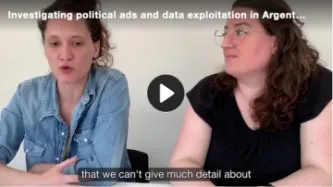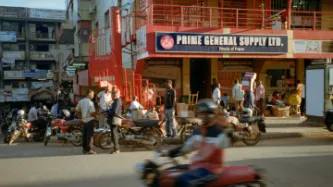Search
Content type: Video
The incorporation of new technologies to electoral processes is a phenomenon with a global and exponential growth. Despite its benefits, online campaigning is not without challenges, and can pose threats to transparency and equity in electoral competition. Given the role of elections as foundational pillars of the democratic system and a key gateway for the exercise of fundamental civil rights, these implications must be assessed with care and through specific tools.
We at PI, together…
Content type: Case Study
The Ugandan government has a running contract with the Chinese tech giant, Huawei, to supply and install CCTV cameras along major highways within the capital, Kampala, and other cities.
While details of the contract remain concealed from the public, the Uganda Police Force (UPF) released a statement, simply confirming its existing business partnership for telecommunication and surveillance hardware, and software between the security force and Huawei. However, it is not clear whether the…
Content type: Examples
Our partners from Unwanted Witness in Uganda wrote a formal letter to the Ministry of Information Communications Technology and National Guidance demanding for strict observance of human rights for any intended use of surveillance technologies to fight COVID-19.
In a letter addressed to the Permanent Secretary Ministry of ICT, Hon. Vincent Bagiire and copied to Minister Judith Nabakooba, calls on government to respect its human rights obligation and restrain from exercising excessive…
Content type: Examples
Ten Ugandan police officers were charged with torture after allegedly caning 38 women and forcing them to swim in mud in Elegu, a town in the northern part of the country. Police have also arrested 23 people during a raid on a shelter for homeless lesbian, gay, bisexual and transgender youth, accused them of disobeying orders by remaining in the shelter, and charging them with a negligent act likely to spread infection or disease.
Source: https://www.bbc.co.uk/news/world-africa-52214740…
Content type: Examples
The Uganda Communications Commission announced on March 22 that it would crack down on people spreading fake videos and misinformation about the novel coronavirus through social media, noting that this behaviour is illegal under the Computer Misuse Act, the Data Protection and Privacy Act, and other penal laws. UCC went on to warn in a public notice that it would arrest and prosecute violators.
Sources:
http://www.china.org.cn/world/Off_the_Wire/2020-03/23/content_75847935.htm
https://twitter…
Content type: Examples
The former Big Brother reality TV star Matías Schrank was arrested by the Cybercrime division of the Misiones provincial police, after publishing tweets that claimed that Eduardo Rovira, the president of the Misiones legislature, had contracted COVID-19 on his recent trip to Thailand and was reckless in not immediately going into quarantine but continuing to hold meetings with other high-level government officials. Schrank was charged under Article. 211 of the Criminal Code, which…
Content type: Examples
The Argentinian company Urbetrack is developing a "Cuidate en casa" (Take Care of Yourself at Home) app that it will pitch to government agencies throughout the country. The goal is to contribute to remediating the health crisis by helping enforce quarantine. The plan is that users will download the app and complete a form with their personal details as chosen by the local authority. The app will then generate a "radial geofence" defined by the local authority, within which the user must stay.…
Content type: Examples
The Argentinian Ministry of Transport, working with the state-owned satellite company ARSAT and the telecoms regulator,ENACOM, proposed to the Executive on 31 March 2020 a platform that uses cell tower data to track people on public transport and ensure they comply with quarantine laws. By 28 March, the Ministry of Security had detained 13,006 people for violating the rules. The government believes that although compliance is high, it will deteriorate if quarantine is extended much longer…
Content type: Examples
The San Francisco-based big data company Grandata has created a heat map to show which areas of Argentina are best complying with the quarantine lockdown. Grandata used an "anonymised" dataset collected from apps that provide third parties with geolocation information. The heat map shows if an individual has moved more than 100 meters from the place where they spend most of their time, apparently without taking into account the socio-economic contexts of different cities, where individuals…
Content type: Examples
Argentina's Public Prosecutor's Office will start installing an app on the smartphones of those who violate government-ordered quarantine in the cities of Santa Fé and Rosario. The app will be installed by the province's Criminal Investigation Agency to track those who are under criminal investigation for violating quarantine. The app will send reports to the the MPA investigation office and coordinated by the Attorney General's Office. Individuals will be required to sign a document…
Content type: Examples
On March 23, Argentina's immigration agency, Dirección Nacional de Migraciones (DNM), announced that anyone arriving in the country would be required to install the free COVID-19 Ministry of Health app on their phone for 14 days to ensure they comply with quarantine rules in order to protect the population. The Office of the Chief of Staff had instructed the DNM to adopt this policy when it launched the app, also on March 23. Since launch, the number of unnecessary permissions the app requests…
Content type: Examples
The self-testing web app issued by Argentina's Secretariat of Public Innovation asks for national ID number, email and phone as mandatory fields in order to submit the test. The Android version requires numerous permissions: calendar, contacts, geolocation data (both network-based and GPS), microphone, camera, full network access; change audio settings, run at startup; draw over other apps, prevent device from sleeping.
Sources:
https://www.argentina.gob.ar/coronavirus/app
https://play.…
Content type: Examples
The free app Testeate, developed by the company Adrómeda in collaboration with the Association of Information and Communication Technologies of Mar del Plata (ATICMA) and the Chamber of Software and Computer Services Companies of Argentina (CESSI) and launched in the Municipality of General Pueyrredón on March 26, is intended to enable direct information exchange between Argentina's National Ministry of Health and the population by offering constantly updated information in any city and…
Content type: Examples
A group of independent developers in Argentina started CoTrack, a public crowdsourced effort to develop an app to track and slow the spread of the virus. CoTrack registers each user's geographic movements and looks for times when they are close to people who have been diagnosed with COVID-19. When there is a confirmed case, a user who has the app can share their data with the community so others can automatically be notified that they should take precautions. The Ministry of Health for the area…
Content type: Examples
An Argentinian crowdsourcing website is collecting information on flights with passengers who were reported as testing positive for COVID-19. Users are asked to enter their email address and the date, airline, and flight number, and tick a box to indicate that someone on their flight was infected. No information is provided on who operates the site, but the terms and conditions indicate that it uses open data flows alongside the collected data.
Source: http://www.checkmyvirusrisk.com/CO/…
Content type: News & Analysis
This piece was originally published by Unwanted Witness here.
Today marks exactly one year since Uganda passed its data protection law, becoming the first East African country to recognize privacy as a fundamental human right, as enshrined in Art 27 of the 1995 Uganda Constitution as well as in regional and International laws.
The Data Protection and Privacy Act, 2019 aims to protect individuals and their personal data by regulating processing of personal information by state and non-state…


